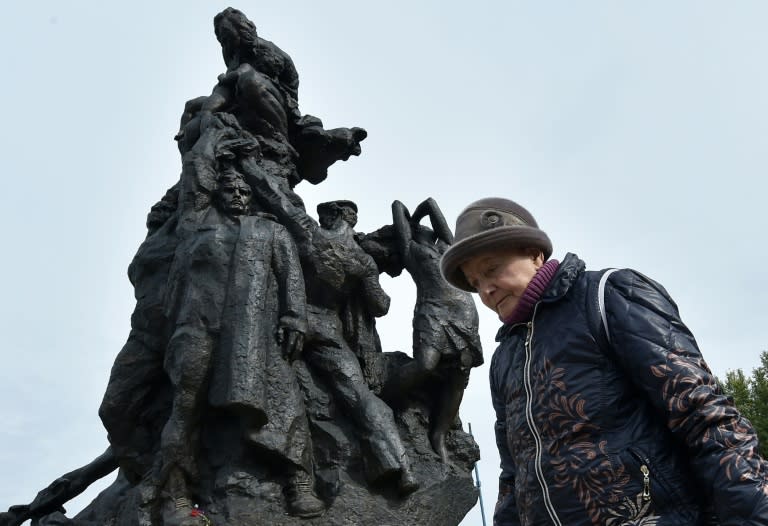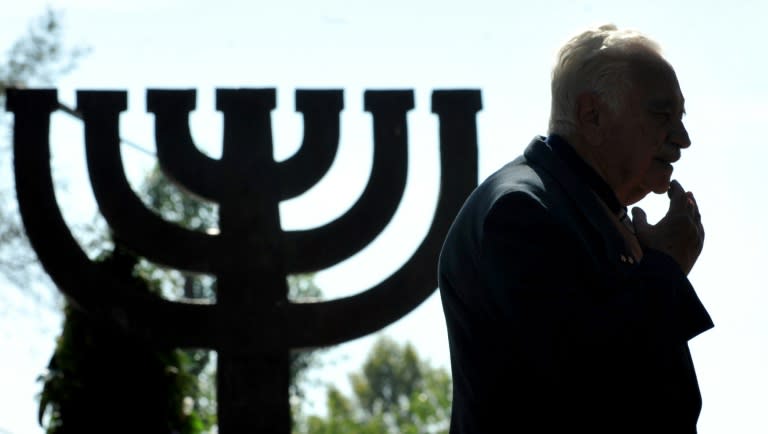Sombre Ukraine marks 75 years since Nazi slaughter of Jews
A sombre Ukraine on Thursday marked 75 years since the Nazis slaughtered 34,000 Jews on the outskirts of Kiev during one of the worst single massacres of the Holocaust. The carnage at the Babi Yar ravine has prompted soul-searching and disputes in Ukraine over the participation of local collaborators in the killings and atrocities that followed. Israeli President Reuven Rivlin was meant to join a memorial ceremony led by Ukrainian leader Petro Poroshenko and attended my other global dignitaries. But Rivlin cut short his visit due to the death of Israeli co-founder Shimon Peres -- although not before drawing criticism for "undiplomatic" comments about Ukrainians' role in the Babi Yar slaughter. Poroshenko tried to calm the air by stressing that "there have been those (in Ukraine) for which one felt shame. And this, too, cannot be erased from our collective memory. "No Ukrainian has the right to forget this tragedy," he told a commemoration at which children played a mournful concert before blue skeletal statues honouring the victims. German President Gauck told the thousands gathered under two giant white tents that the Nazis "even used nationalist Ukrainians as assistant police." "But we also admit that not only special fences (of death camps), but ordinary Wehrmacht (soldiers) were involved in these crimes," Gauck said. - 'Reporting Jews to Nazis' - The anniversary comes at a sensitive time for the conflict-riven state. Its deadly dispute with Russia has sparked a rising tide of nationalism that lionises some groups linked to war-time crimes against Jews. Members of the Ukrainian Insurgent Army (UPA) initially collaborated with Hitler's generals because they felt the Nazis could help them win independence from the Soviet Union's even-more-hated Stalin. Rivlin did not shy away from telling Ukrainian lawmakers in Kiev on Tuesday that "many of the crimes were committed by Ukrainians" during the Holocaust. "The fighters of UPA were especially prominent," said Rivlin. "They victimised the Jews, killed them, and in many cases reported them to the Nazis." New-York based World Jewish Congress chief Robert Singer also urged at Babi Yar for "all the countries involved, not just Ukraine, (to) take responsibility for their actions during that dark time". Poroshenko himself will next travel to Israel to attend Friday's funeral of Peres. - 'The path to death' - The Nazis and local auxiliaries exterminated the Jews between September 29 and 30 of 1941 as they blitzed their way toward Moscow and captured major cities on the western Soviet flank. The last survivor of that tragedy still alive in Kiev told AFP that Jews comprised about a quarter of the city's 800,000-strong population at the time. About 100,000 live in the city today out of a population of around 2.8 million Yiddish is almost never heard on the streets and Babi Yar is also rarely mentioned by locals. But the horror of those 48 hours are still vividly etched in the memories of survivors such as Raisa Maistrenko. "We were gathered and sent along 'the path to death'," she said in an interview at what today is a green ravine scattered with Soviet-era monuments and a Jewish Menorah candelabrum put up when the Soviet empire was crumbling in 1991. Just 29 people managed to escape execution by either falling into the mass grave before being shot in the back or by wearing crosses to hide their true religion. Maistrenko was only three years old when her 18 relatives failed to return from the ravine. "All the Jews decided to go because they thought they would be evacuated by train as the railway station was nearby. Nobody could possibly assume there would be a mass execution," she recalled in hushed tones. "We heard the shooting behind us, but (my) granny -- she kept holding me -- did not look back and kept running until she fell exhausted among the graves in a nearby cemetery." Maistrenko said they were hiding there until sunset before finding their way back home under the cover of darkness. There -- to their relief -- no one reported them to the Nazis.




